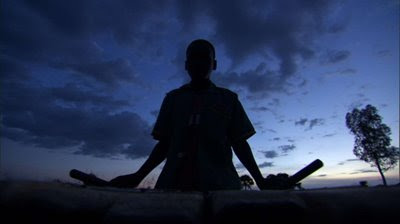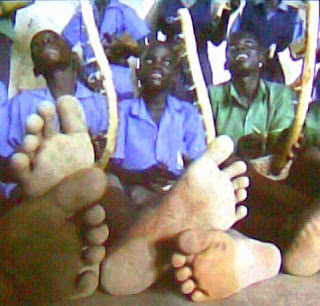War/Dance: “In our daily lives there must be music”
 It’s currently International Education Week in the U.S., which translates into busy times for me in my dayjob life. I don’t mind this kind of busy, because I am tasked with bringing global culture to our campus for a week of free activities. In a welcome intersection of music and film, my event Tuesday was a screening of the exceptional film War/Dance.
It’s currently International Education Week in the U.S., which translates into busy times for me in my dayjob life. I don’t mind this kind of busy, because I am tasked with bringing global culture to our campus for a week of free activities. In a welcome intersection of music and film, my event Tuesday was a screening of the exceptional film War/Dance.
I sat in a darkened theater in the late afternoon and watched a group of school children from Northern Uganda prepare their music and impassioned dance for their National Music Competition. The children are displaced refugees of the Acholi tribe, which has been subject to a horrific persecution at the hands of the Lord’s Resistance Army for twenty years — abducted, forced into child soldierhood, raped, orphaned. This tribal war has left 200,000 Ugandan children without parents, seen 30,000 abducted to fight for the LRA, and forced almost all of the Acholi people to leave the green hills of their ancestral homes and relocate to dusty camps, guarded by military 24 hours a day.
But — when these children are swimming in the waves of their music, they are free. You can see it in the spark in their smiles, the unbridled earthy joy shining in their faces when they sing, when they stomp the dry earth and arch their backs. As one girl says in her sonorous native tongue, “In our daily lives there must be music. In everything we do, if there’s music, life becomes so good. That’s why I want to be part of music.”
Suffering of great magnitude is extremely difficult to wrap our Western minds around, and the filmmakers incisively narrow the lens to track three young teenagers and the stories of the dark path that brought them to the camp, to this school in the remotest part of Northern Uganda. The kids take seriously the opportunity to compete with the other 20,000 schools throughout Uganda to represent their tribe as one of the best. When they perform the 500-year-old Bwola dance of their tribe, they radiate pride and spirit as they stomp and whirl in shades of a Feist video (I must not be the only one who thought that).
The film is a deeply human exploration, one that made me question what it is within the human spirit that flares up, that remains unbreakable and irrepressible. One of the main characters Nancy explains, “When I’m singing, I feel that everything is exactly how it used to be. Everything feels okay again, like I’m at home and not in the camp.” Rose muses, “Music is the most important part of Acholi culture. It is our tradition. Even war cannot take it from us.
 War/Dance is shot with the stunning eye of a photographer, with shots that make you ache in their purity, their power, and their sadness. The dance scenes are swirls of color and shifting focus. As they tell their unflinching stories, the skin of the children shines with an illuminated vibrancy that seems out of place in their dusty, hard surroundings.
War/Dance is shot with the stunning eye of a photographer, with shots that make you ache in their purity, their power, and their sadness. The dance scenes are swirls of color and shifting focus. As they tell their unflinching stories, the skin of the children shines with an illuminated vibrancy that seems out of place in their dusty, hard surroundings.
Out of the gritty horrors of a story that could be the bleakest of bleak, hope and pride rise up in the kids. In music, they survive. It’s a message that resonated deeply with me, and indeed should with all who have ever felt the power of music in any capacity. I give this movie (and the corresponding music) my highest recommendation of the screen this year.
And hey, the percussion that punctuated all the pounding-heart moments of this film made the tiny little djembe player in my own heart leap a little:
Khine Sine – Doudou N’diaye Rose [wiki]
You can watch War/Dance online now if you have Netflix, and the soundtrack is on Amazon. For more information about how to support these kids in Northern Uganda, visit shineglobal.org, a foundation set up by the filmmakers.



 Name: Heather Browne
Name: Heather Browne